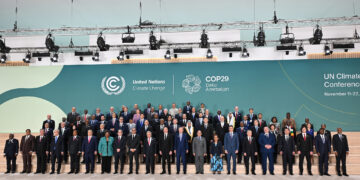As part of efforts to hasten the transition to a low-carbon economy, British investment bank Barclays has increased its sustainable and transition finance target to $1 trillion by 2030.
This includes clients’ long-term Green, Social, Transition, and broader Sustainability-linked Financing needs, such as corporates, governments, and consumers. Financing for climate and environmental solutions, such as green mortgages, energy-efficient technology, and renewable energy, as well as financing for broader social and sustainability work, such as sustainability-linked structures and areas like affordable housing, will all contribute to the target.
Furthermore, Barclays announced that it will increase the amount of its own capital invested in climate start-ups through its Sustainable Impact Capital initiative to 500 million pounds by 2027, up from 175 million pounds in 2025.
Also, the Group has now exceeded its 2018 target of delivering £150 billion in social and environmental financing by 2025 and is on track to meet its target of delivering £100 billion in green finance by 2030.
The Group recognises the importance of determining financial eligibility and transparently reporting progress toward this goal. In a revised version of Barclays’ Sustainable Finance Framework, Barclays has outlined the Green, Social, and broader Sustainability-linked Financing transactions eligible under the new target. This is a clear set of criteria that reflects industry principles and market practice, and it has been updated with the help of Sustainalytics. Progress toward these goals will be reported alongside their financial results. In addition, recognising that high-emitting sectors require significant financing to pivot their technology and infrastructure, Barclays is developing a similar Transition Finance Framework that will determine the eligibility of Transition transactions under this target.
C.S. Venkatakrishnan, Barclays’ Group Chief Executive, said: C.S. Venkatakrishnan, Barclays’ Group Chief Executive, said: “Today’s announcements reinforce our group-wide strategic priority to capture the opportunities from the transition to a low-carbon economy. From facilitating financing for high-emitting sectors to adapt, to our own equity investments in climate-tech start-ups, to our support for customers and small businesses, Barclays’ diverse ecosystem has the capability and expertise to accelerate the transition across all aspects of the economies that we serve.”
Daniel Hanna, Barclays Global Head of Sustainable Finance for the Corporate and Investment Bank, said: “The final COP27 text stated that $4-6 trillion a year needs to be invested in renewables and decarbonisation solutions until 2030 – including investments in technology and infrastructure – to allow us to reach net-zero emissions by 2050. Barclays is uniquely positioned to help scale the new climate technologies that will decarbonise industries and create green jobs. Many of the technologies that are required to achieve Net Zero have not yet reached commercial scale. Barclays can play a critical role though leveraging our experience as an advisor, bank, and investor through our Sustainable Impact Capital Programme to help accelerate their development and adoption.“





